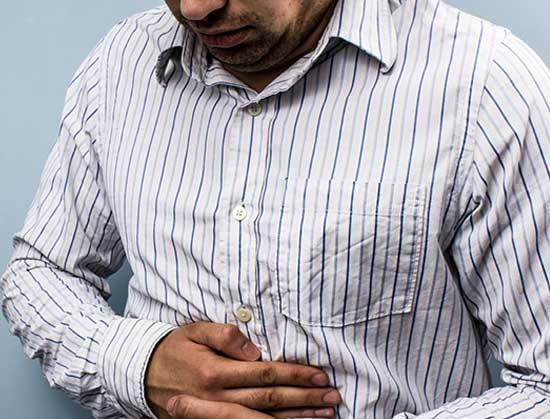

June 22, 2015
Are you one of the millions of people dealing with daily stomach pain? Do you pop antacids like Tic Tacs? Or, do you just expect to feel sick after you eat? If so, this is no way to live your life - it is time to get to the root of the problem! The first thing to do is to make an appointment with your doctor to discuss your symptoms. In the meantime, let’s do a bit of investigating so you can possibly narrow down your problem.
Let’s take a look at some of the more common symptoms people experience: Bloating, cramping, gas, constipation, pain after eating, heartburn, nausea, diarrhea or occasional pain that worsens with stress. Some of the possible causes include:
Diverticulitis: This is a digestive problem that occurs within the walls of the large intestine. Over time, small pouches form that can become inflamed or infected when food particles get trapped inside. This condition can be very painful but can be treated with antibiotics, pain medication and modifications in diet. In some rare cases, a person may need surgery to remove the portion of the intestine if it has become diseased.
Food allergy or lactose intolerance: In most cases, a true food allergy causes allergy-type reactions such as hives, rashes or even breathing emergencies. The majority of people hav food sensitivities, which are more digestive in nature, rather than allergic. If you have symptoms within an hour or so of eating, then chances are you are having difficulty digesting the food. Try eliminating one food at a time to see if you feel a difference.
Gallstones or sludge: The gallbladder is a small digestive organ that sits under the liver and stores bile. Bile is released upon digestion and helps to digest fats. High consumption of fatty foods and proteins can encourage the development of gallstones, which are hardened pebbles of bile. Once these travel in the bile duct, they can cause pain and abdominal problems. Also, sludge, or thick bile, can build up in the gallbladder and cause similar problems as gallstones. If your doctor determines that the stones and sludge have damaged the gall bladder, surgery to remove the gall bladder may be recommended.
GERD: Gastroesophageal Reflux Disease is a condition in which stomach acid flows back up the esophagus, causing that burning sensation you feel in your chest. Sometimes it is worse after eating highly acidic foods or lying down after eating. The root cause may be dietary, but in some cases, a hernia may be to blame. Make sure you see your doctor because over time, the acid can cause permanent damage to the esophagus. Usually over-the-counter medication or changes in diet can dramatically improve this condition.
Hiatal hernia: This tiny bulge in the stomach wall can push up against the diaphragm and trigger acid reflux or GERD. If you are suffering with excessive acid reflux, it is a good idea to have your doctor rule out a hernia.
Irritable Bowel Syndrome: Also known as IBS, is a digestive problem that usually is worsened with stress. Take a good hard look at your diet and see if you can make any connections to the foods you eat and your symptoms. IBS has not been classified as serious, but it is annoying. Most people can manage their symptoms with small dietary changes and stress reduction.
More severe symptoms: Heartburn that won’t go away, fever, bloody diarrhea, weight loss, pain that wakens you at night or severe abdominal cramping. Please see your doctor immediately. These symptoms can indicate:
Heart attack: Yes, believe it or not, we can sometimes incorrectly assume we are having “acid reflux”, but it may be a sign of a heart attack. See your doctor right away, particularly if this is combined with occasional shortness of breath or tightness in your chest.
Ulcerative colitis: This condition causes inflammation and sores in the lining of the colon (large intestine). It may come and go, but flare-ups can be severe. There are medications to help manage the condition, but in some cases, surgery may be required to remove damaged portions of the colon.
As you can see, symptoms overlap so it will take some investigation and a visit with your doctor to make a correct diagnosis.
GuideWell Emergency Doctors can help with this and many other major and minor medical illnesses and injuries. Please visit our services page to find out how we can help you!